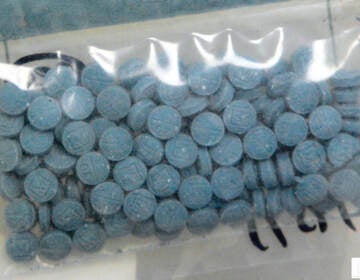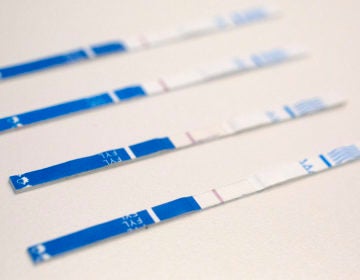Why do some N.J. lawmakers want to increase prison terms for heroin possession?
Some criticize a call for tougher penalties as a harbinger of a return to failed policies from the days of the war on drugs.

New Jersey Assemblyman John McKeon is one of four state lawmakers proposing longer prison terms for possession of heroin or fentanyl. (Phil Gregory/for NewsWorks)
In an era of growing tolerance toward people struggling with drug addiction, four New Jersey lawmakers want to impose tougher penalties on those caught with heroin or fentanyl, a powerful opioid.
A bill in the New Jersey Legislature would increase possible prison terms for defendants convicted of possessing, selling, or manufacturing the drugs — in some cases quadrupling the amount of time they could spend behind bars.
New Jersey has seen an explosion in drug use in recent years amid the nationwide opioid crisis. Many users begin by taking prescription painkillers and later switch to more accessible options including heroin and its stronger cousin, fentanyl.
But the proposed legislation seems to run counter to recent efforts by Gov. Chris Christie, a Republican, to fight the opioid scourge in New Jersey by connecting drug users with resources to get clean.
“We’re sending addicts into jail. We’re not treating them. They remain addicts. They leave jail. And we expect that they’re not going to commit crimes to further the disease that they have,” Christie said at a pain-management conference at Cooper University Hospital in Camden last week. “They will, and they do.”
“We need to break that chain through treatment.”
Possessing heroin or fentanyl is already a serious crime in New Jersey. How much prison time an offender could face depends on the amount of drugs they have.
The legislation would reduce that amount for first-, second-, and third-degree charges, effectively upping penalties for the same quantity of the drug.
For example, the punishment for possessing 5 grams of heroin would go from a three- to five-year prison term to a five- to 10-year sentence. Instead of three to five years behind bars for carrying 10 grams, a defendant could face 10 to 20 years in prison under the proposal.
The three Democratic sponsors of the Assembly bill — John McKeon, Annette Quijano, and Valerie Vainieri Huttle — declined interview requests Friday.
An email seeking comment sent to Democratic state Sen. Linda Greenstein late Friday was not returned.
Although the bill appears to be aimed at drug dealers — a spokesman for the Assembly Democrats noted that 10 grams of heroin contains more than 330 lethal doses — critics say the harsher penalties could also fall on users arrested with small amounts of the drug.
“This bill is really a return to the failed policies of the past,” said Roseanne Scotti, state director of the Drug Policy Alliance.
Scotti, who said the proposal smacked of the tough-on-crime policies common during the war on drugs, noted that harsher punishments do little to crack down on the illegal drug trade or help addicts recover.
“These increased sentences cost us a lot of money. They do nothing to reduce the availability or purity of drugs on the street,” she said. “And they destroy lives.”
The Drug Policy Alliance was one of 80 organizations and advocates, including the ACLU and the NAACP, to sign a letter to the Assembly Judiciary Committee in opposition to the bill.
The committee is scheduled to consider the bill Monday morning.
“This needs to be treated as a public health issue,” Scotti said, “not as a criminal justice issue.”
WHYY is your source for fact-based, in-depth journalism and information. As a nonprofit organization, we rely on financial support from readers like you. Please give today.




